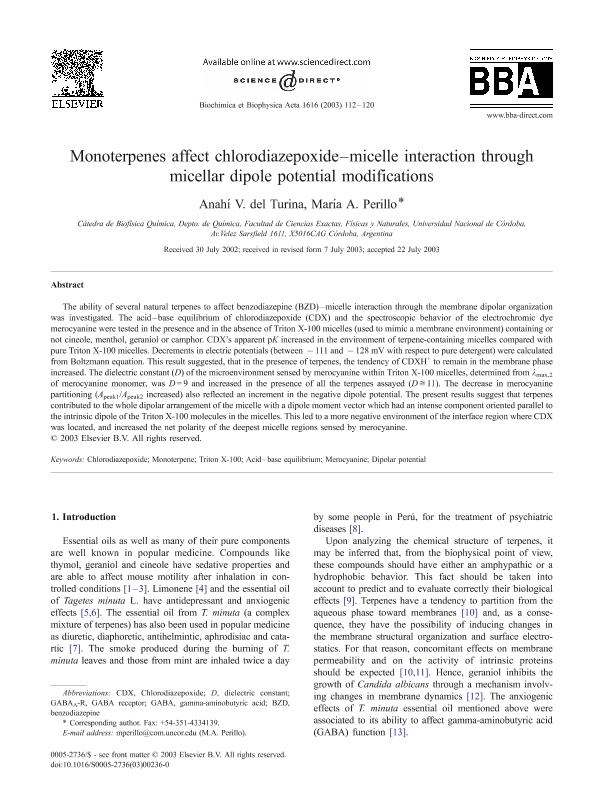Artículo
Monoterpenes affect chlorodiazepoxide–micelle interaction through micellar dipole potential modifications
Fecha de publicación:
10/2003
Editorial:
Elsevier Science
Revista:
Biochimica et Biophysica Acta - Biomembranes
ISSN:
0005-2736
Idioma:
Inglés
Tipo de recurso:
Artículo publicado
Clasificación temática:
Resumen
The ability of several natural terpenes to affect benzodiazepine (BZD)-micelle interaction through the membrane dipolar organization was investigated. The acid-base equilibrium of chlorodiazepoxide (CDX) and the spectroscopic behavior of the electrochromic dye merocyanine were tested in the presence and in the absence of Triton X-100 micelles (used to mimic a membrane environment) containing or not cineole, menthol, geraniol or camphor. CDX's apparent pK increased in the environment of terpene-containing micelles compared with pure Triton X-100 micelles. Decrements in electric potentials (between -111 and -128 mV with respect to pure detergent) were calculated from Boltzmann equation. This result suggested, that in the presence of terpenes, the tendency of CDXH+ to remain in the membrane phase increased. The dielectric constant (D) of the microenvironment sensed by merocyanine within Triton X-100 micelles, determined from λmax,2 of merocyanine monomer, was D=9 and increased in the presence of all the terpenes assayed (D≅11). The decrease in merocyanine partitioning (Apeak1/A peak2 increased) also reflected an increment in the negative dipole potential. The present results suggest that terpenes contributed to the whole dipolar arrangement of the micelle with a dipole moment vector which had an intense component oriented parallel to the intrinsic dipole of the Triton X-100 molecules in the micelles. This led to a more negative environment of the interface region where CDX was located, and increased the net polarity of the deepest micelle regions sensed by merocyanine. © 2003 Elsevier B.V. All rights reserved.
Archivos asociados
Licencia
Identificadores
Colecciones
Articulos(IIBYT)
Articulos de INSTITUTO DE INVESTIGACIONES BIOLOGICAS Y TECNOLOGICAS
Articulos de INSTITUTO DE INVESTIGACIONES BIOLOGICAS Y TECNOLOGICAS
Citación
Turina, Anahi del Valle; Perillo, Maria Angelica; Monoterpenes affect chlorodiazepoxide–micelle interaction through micellar dipole potential modifications; Elsevier Science; Biochimica et Biophysica Acta - Biomembranes; 1616; 2; 10-2003; 112-120
Compartir
Altmétricas




